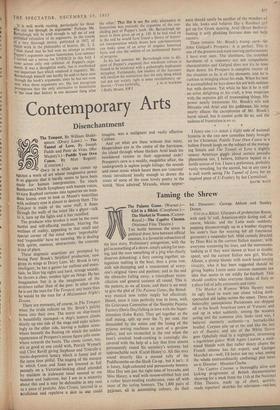Contemporary Arts
Disenchantment
The Tempest. By William Shake- speare. (Drury Lane.) — The Tunnel of Love. By Joseph Fields and Peter de Vries. (Her Majesty's.)—Paddle Your Own Canoe. By Max Regnier.
(Criterion.)
43° ONCE in a while one comes up against a work of art whose imaginative power iS so gigantic that it hardly seems to have been made for human interpretation. To touch Beethoven's Ninth Symphony with human voices, to turn Raphael cartoons into tapestries on mun- dane looms, even to look at Monet's waterlilies with ordinary eyes is almost to destroy them. The Tempest is made of the same stuff, it floats through the walls of the mind like a ghost—talk to it, turn up the lights and it has vanished.
The producer who invokes it must be the most tactful and self-effacing medium, blurring the outlines of reality, appealing to that small and special corner of the mind where `improbable' and 'impossible' have no meaning. He is dealing with spirits, essences, abstractions; the concrete is out of place. These dogmatic assertions are prompted by seeing Peter Brook's Stratford production, now given its wings at Drury Lane. Mr. Brook is very intelligent; he has a gcnius for outlines and essen- tials; he likes big sights and hard, strange sounds; he throws a clear, sombre light on things. He has imagination but it is the imagination of the architect rather than of the poet. In other words he is not the man for The Tempest, any more than he would be the man for A Midsummer Night's Dream.
There are moments, of course, in The Teal pest when the crude colours on Mr. Brook's palette come into their own. The storm on ship-board is beautifully managed—a ship's lantern climbs dizzily up one side of the stage and sinks sicken- ingly to the other side, leaving a hollow some- where beneath the floating rib which the sudden appearance of Prospero's serene figure jolts some- where towards the boots. The comic scenes, too, are as good as one could wish, Patrick Wymark and Clive Revill giving Stephano and Trinculo a manic-depressive lunacy which is funny and at the same time pitiful. The staging of the masque in which Ceres and Juno are lowered in full panoply on a Victorian-looking cloud attended by maidens in iridescent tinsel seemed to me tasteless and ludicrous, but I am in a minority about this and it may be defensible in any case as a piece of pastiche. Alec Clunes, interred in as scrofulous and repulsive a skin as one could
imagine, was a malignant and vastly effective Caliban.
And yet what are these without that misty, Hesperidean eye in the centre of the hurricane, the island through whose thickets Ariel leads his bewildered victims to their appointed ends? Prospero's cave is a muddy, megalithic affair, the undergrowth is sapless jungle foliage; the sounds and sweet music which haunt them are 'concrete' music introduced loudly enough to drown the music of some of the most lovely poetry in the world. 'Most admired' Miranda, whose appear- ance should surely be another of the wonders of the isle, looks and behaves like a Roedean girl got up for Greek dancing. Ariel (Brian Bedford) footing it with plodding featness does not help matters.
There remains Mr. Brook's trump card—Sir John Gielgud's Prospero: it is perfect. This is one of the greatest and most moving performances I have ever seen. The aloofness, the troubled harshness of a visionary are not sympathetic characteristics and Gielgud does not try to tone them down; his Prospero is complete master of the situation as he is of the elements, and he' is ruthless in bringing about his ends. When his task is accomplished he lays down his art With sadness but with decision. Yet while he has it he is still an artist delighting in his craft, a true magician with the supreme gift of transmuting things. His power nearly transmutes Mr. Brook's sets and Miranda and Ariel and the goddesses, his voice nearly effaces the cacophonies of Mr. Brook's harsh island, but it cannot quite do so, and the sadness of frustration is on us.
I fancy one ciin detect a slight note' of national hysteria in the two new comedies lately brought on for Christmas. Paddle Your Own Canoe is a hollow French laugh on the subject of the manag- ing female and The Tunnel of Love a slightly uneasy American giggle about certain periodic phenomena not, I believe, hitherto tapped as a fertile source of fun. I have a preference, probably vastly revealing, for the second, but in any case it is well worth seeing The Tunnel of Love for an inspired piece of U-Foolery by Ian Carmichael..






































 Previous page
Previous page